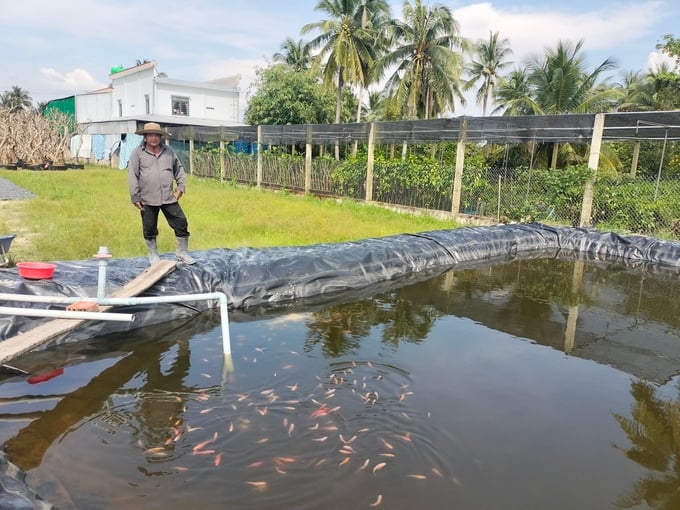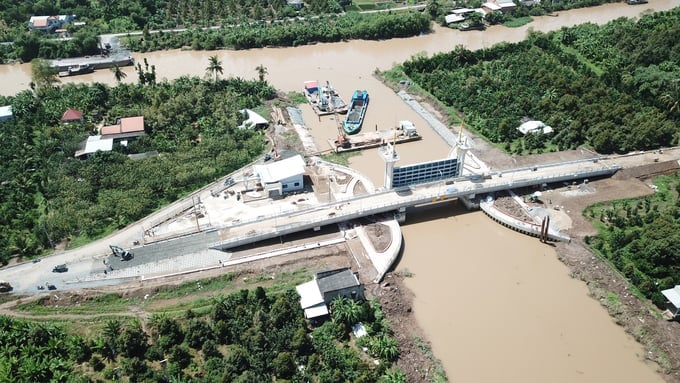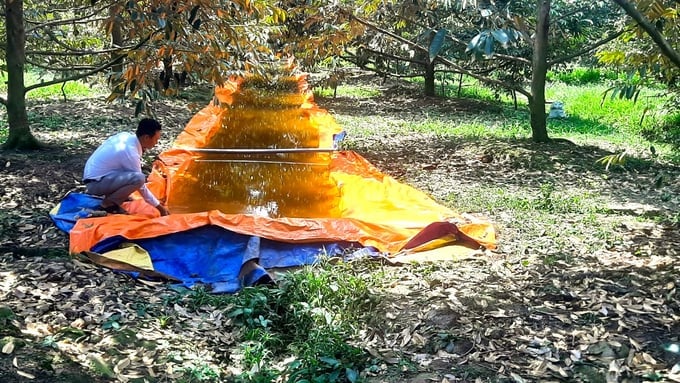May 21, 2025 | 07:49 GMT +7
May 21, 2025 | 07:49 GMT +7
Hotline: 0913.378.918
May 21, 2025 | 07:49 GMT +7
Hotline: 0913.378.918

Farmers in Ben Tre province storing fresh water in floating reservoirs. Photo: Minh Dam.
Saltwater intrusion in the anticipated dry season of 2023-2024 has been projected to occur prematurely and last longer compared to the historical averages. Salinity levels of 1‰ are expected to permeate the entirety Ben Tre province from January to May 2024, with the most affected areas being the Ham Luong and Cua Dai river systems. It is imperative for the local agricultural sector to actively address the challenges posed by saltwater intrusion and safeguard the output of agricultural production.
As a result, the Ben Tre province's Department of Agriculture and Rural Development has urged farmers to consistently monitor saltwater intrusion developments through various communication channels, including radio broadcasts, newspapers, television programs, and the "Accompanying Farmers" initiative. Furthermore, farmers are recommended to implement a range of water storage measures, which include excavating ponds, lining canal beds, and utilizing water storage bags, to cater to both daily needs and agricultural production activities.

The sluice gate at Ben Ro Canal in Tien Long commune, Chau Thanh district, Ben Tre province, is prepared to prevent saltwater intrusion from the Ham Luong River into the upper reaches of the Ba Lai River. Photo: TL.
Farmers need to adhere to the seasonal planting schedule as well as account for the state of local water resources. Additionally, they should monitor and measure the salinity of water before irrigation. Utilizing salt-tolerant plant varieties and applying advanced scientific and technical methods for crop care under restricted fresh water conditions are also essential. Special attention should be given to off-season durian and rambutan farms, and the high volume of ornamental flower baskets for the Lunar New Year.
Regarding livestock production in the coastal districts of Ba Tri, Binh Dai, and Thanh Phu, proactive measures should be taken to stockpile food and drinking water for the herds of livestock. Implementing hygiene measures, detoxification and disinfection of pens and barns, and preventing common diseases in livestock and poultry during the dry season are crucial.
Regarding aquaculture production, constant monitoring of weather and water environment indicators such as temperature, salinity, and pH levels is necessary to timely arrange suitable seed variety and crop schedule. The aquaculture pond system must ensure sufficient water reserves for production, including the construction of qualified sedimentation and water storage ponds. Furthermore, the relocation of aquaculture production to areas unaffected by saltwater intrusion or harvesting when aquaculture products reach their commercial size before high saltwater intrusion occurs is highly advised.

Farmers growing durians in farm ditches to store fresh water and prevent saltwater intrusion. Photo: Minh Dam.
Mr. Huynh Quang Duc, Deputy Director of the Ben Tre province's Department of Agriculture and Rural Development, has advised farmers to close the sluice and ditches on the farms during the saltwater intrusion season. On the other hand, farmers must still keep a high level of humidity within their farms, and prune specific crops before saltwater intrusion occurs. Farmers must also constantly monitor the salinity level to draw water for irrigation when possible. Information dissemination within the community is another crucial aspect.
Mr. Nguyen Chi Dung in Long Thoi commune, Cho Lach district, frequently keeps tracks of the salinity level through local reports as well as various news outlets. Notably, Mr. Dung recently invested tens of millions of Vietnamese dong to buy lining canvas for his ponds, and store 200 cubic meters of fresh water.
"If saltwater intrusion occurs, this amount of stored water can be used to irrigate the family's ornamental flower garden for approximately twenty days. If the saltwater intrusion lasts longer, we will hire a boat to transport fresh water from the upstream. I recently read the news that saltwater intrusion will occur early this year, so I am very worried. Like many fellow farmers producing seedlings and ornamental flowers, especially those with off-season durian farms, I have stored water for irrigation," Mr. Dung expressed his concern.
Farmers in Ben Tre province have been proactive in preventing drought and salinity within the last few years. Namely, farmers producing seedlings in Cho Lach and Mo Cay Bac districts often store fresh water on floating reservoirs, or in plastic bags and ponds. On the other hand, fruit tree farmers often dredge ditches within their farms and lay canvas to store water.
Every year, farmers in Ben Tre province prepare over 1,000 ponds with a capacity of at least 200 cubic meters, and a large number of water bags with varying storage capacities to store water during the saltwater intrusion season.
Translated by Nguyen Hai Long

(VAN) Japan's grant aid project contributes to capacity building, promoting organic agricultural production, and fostering sustainable community development in Dong Thap province.

(VAN) For years, the CRISPR-Cas9 genome technology has been reshaping genetic engineering, a precision tool to transform everything from agriculture to medicine.

(VAN) Vietnam aims to become a 'leader' in the region in the capacity and managing effectively soil health and crop nutrition.
![Reducing emissions from rice fields: [Part 1] Farming clean rice together](https://t.ex-cdn.com/nongnghiepmoitruong.vn/608w/files/news/2025/05/05/z6509661417740_a647202949c539012a959e841c03e1d3-nongnghiep-143611.jpg)
(VAN) Growing clean rice helps reduce environmental pollution while increasing income, allowing farmers to feel secure in production and remain committed to their fields for the long term.
/2025/05/19/5136-1-144800_230.jpg)
(VAN) The Nghe An Provincial People's Committee has just approved the list of beneficiaries eligible for revenue from the Emission Reductions Payment Agreement (ERPA) in the North Central region for the year 2025.

(VAN) 14 out of 35 domesticated elephants in Dak Lak province have had their living conditions improved, with 11 of them currently participating in the non-riding elephant tourism model.

(VAN) Muong Nhe Nature Reserve hopes that being upgraded to a national park will lay the foundation for forest protection efforts to be carried out in a systematic, modern, and sustainable manner.